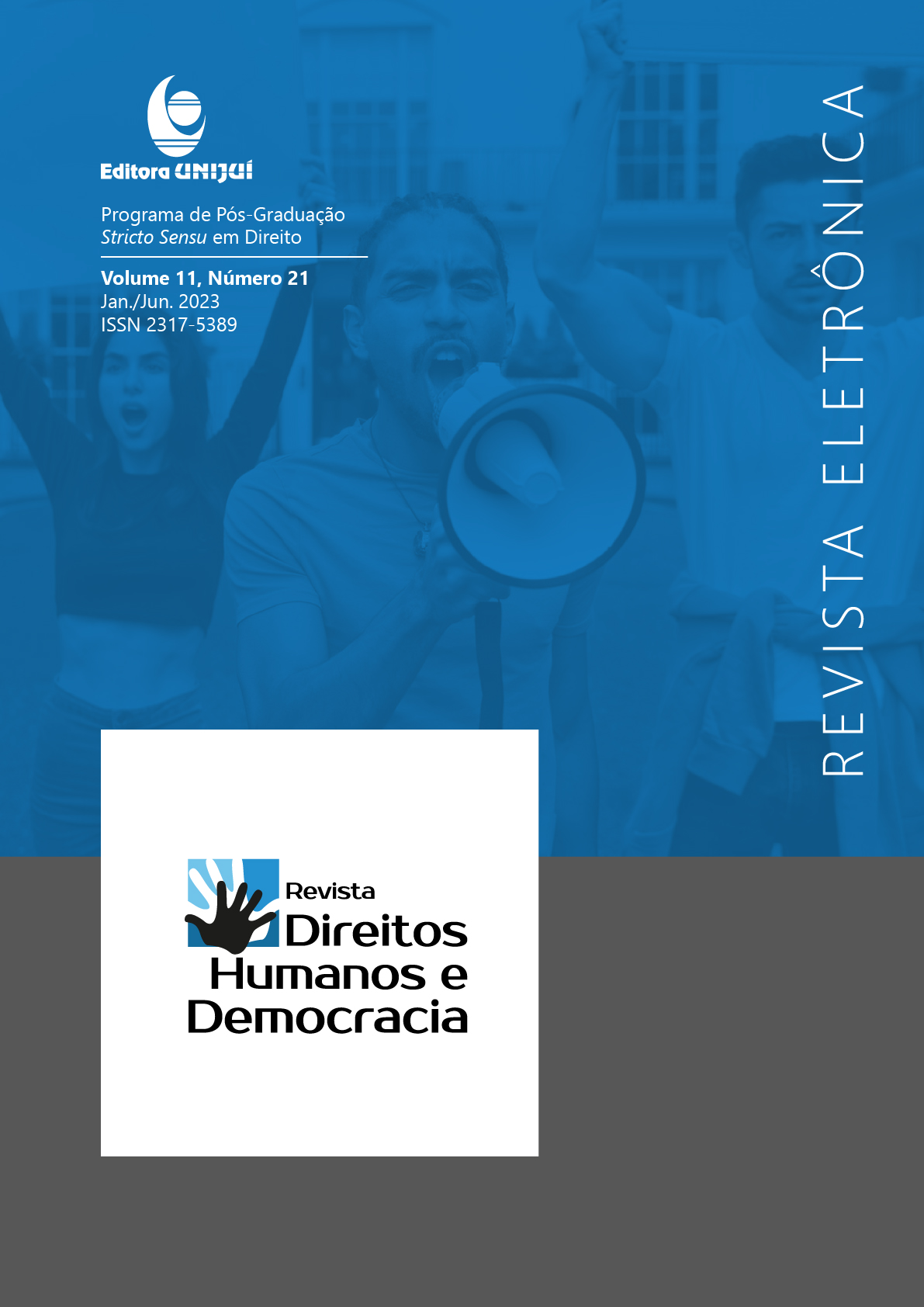Incarceration, justice and love: thinking beyond indifference from levinas
DOI:
https://doi.org/10.21527/2317-5389.2023.21.12223Keywords:
Direitos humanos, encarceramento, encarceramento em massa, ética, LevinasAbstract
The article deals with the disfigured prisoner as a evil personification and his humanity denied by hegemonic discourses in Brazilian society today. The work aims to problematize the stigmatizing vision launched on this social group and to think about new horizons of meaning about prison, respecting fundamental rights and guarantees provided for in the Brazilian Constitution and in the human rights treaties to which the country is a signatory. The study is located interdisciplinarily in human rights and philosophy, has an eminent theoretical-critical character, based on qualitative bibliographic research, as it investigates the image of the prisoner at the time that proposes interventions in this imaginary. Using the philosopher Emmanuel Levinas’ ethics to analyze the restriction of freedom, the work reflects on the human life conditions of recognition in Judith Butler, the endogenous orientalism concept for Rafael Godoi and the criminal justice practices that claim to universality, by Bethânia Assy. As a conclusion, the study observes that the vocation against humanity in the prisoner denies the ethical framework available to avoid the incidence of protective norms against a specific vulnerable group, highlighting that the condemnation for the practice of illicit attitudes does not erase the reality of human infinity in the prisoner, which deserves support. Finally, the authors refute imprisonment as a socially isolated locus and cite actions for the proximity to prisoners to tear apart the ideological barrier built between the self-styled “good citizens” and those labeled “criminals”, not worthy of protection.
References
ASSY, B. de A. Subjetivação e ontologia da ação política diante da injustiça. Revista Direito e Práxis, v. 7, n. 3, p. 777-797, 2016.
BÍBLIA. Bíblia Sagrada: nova tradução na linguagem de hoje. Trad. João Ferreira de Almeida. Barueri, SP: Sociedade Bíblica do Brasil, 2001.
BRASIL. Ministério da Justiça e Segurança Pública. Departamento Penitenciário Nacional. Levantamento Nacional de Informações Penitenciárias. Disponível em: https://www.gov.br/depen/pt-br/sisdepen/sisdepen. Acesso em: 5 abr. 2021.
BUTLER, J. P. Quadros de guerra: quando a vida é passível de luto? Rio de Janeiro: Civilização Brasileira, 2018.
DAVIS, A. Y. A liberdade é uma luta constante. São Paulo: Boitempo, 2018.
FÓRUM BRASILEIRO DE SEGURANÇA PÚBLICA. Anuário Brasileiro de Segurança Pública. ISSN 1983-7364, a. 14, p. 306-307, 2020. Disponível em: https://forumseguranca.org.br/wp-content/uploads/2020/10/anuario-14-2020-v1-interativo.pdf. Acesso em: 5 abr. 2021.
GODOI, R. Fluxos em cadeia: as prisões em São Paulo na virada dos tempos. São Paulo: Boitempo, 2017.
LEVINAS, E. Totalidade e infinito. Lisboa: Edições 70, 1988.
LEVINAS, E. Humanismo do outro homem. Petrópolis: Editora Vozes, 1993.
LEVINAS, E. Entre nós: ensaios sobre a alteridade. Petrópolis: Editora Vozes, 2004.
LEVINAS, E. Ética e infinito. Madri: Antonio Machado Libros, 2015 [Kindle].
MINAYO, M. C. de S. (org.). Pesquisa social: teoria, método e criatividade. Petrópolis: Vozes, 1994.
RAMOS, A. J. de (Pe.). O silêncio gritante de um massacre perene. In: COUTINHO JÚNIOR, J. et al. (org.). Relatório: a pandemia da tortura no cárcere. Pastoral Carcerária, p. 17-24, 2020. Disponível em: https://carceraria.org.br/wp-content/uploads/2021/01/Relatorio_2020_web.pdf. Acesso em: 5 abr. 2021.
SARTRE, J. P. L’Existentialisme est un Humanisme. Paris: Les Éditions Nagel, 1970.
UNIVERSITY OF LONDON. Institute for Crime & Police Research. World Prison Brief. Highest to Lowest – Prison Population Total. Disponível em: https://www.prisonstudies.org/highest-to-lowest/prison-population-total?field_region_taxonomy_tid=All. Acesso em: 5 abr. 2021.
Downloads
Published
How to Cite
Issue
Section
License
Copyright (c) 2023 Revista Direitos Humanos e Democracia

This work is licensed under a Creative Commons Attribution 4.0 International License.
By publishing in the Revista Direitos Humanos e Democracia, authors agree to the following terms:
Articles are licensed under the Creative Commons Atribuição 4.0 Internacional (CC BY 4.0), which allows:
Share — copy and redistribute the material in any medium or format;
Adapt — remix, transform, and build upon the material for any purpose, including commercial use.
These permissions are irrevocable, provided the following terms are respected:
Attribution — authors must be properly credited, with a link to the license and indication of any modifications made;
No additional restrictions — no legal or technological measures may be applied that restrict the use permitted by the license.
Notices:
The license does not apply to elements in the public domain or covered by legal exceptions.
The license does not grant all rights required for specific uses (e.g., image rights, privacy, or moral rights).
The journal is not responsible for opinions expressed in the articles, which remain the sole responsibility of the authors. The Editor, with the support of the Editorial Committee, reserves the right to suggest or request modifications when necessary.
Only original scientific articles presenting research results of interest, not previously published or simultaneously submitted to another journal with the same purpose, will be accepted.
References to trademarks or specific products are intended solely for identification purposes and do not imply any promotional endorsement by the authors or the journal.
License Agreement: Authors retain copyright over their articles and grant the Revista Direitos Humanos e Democracia the right of first publication.













